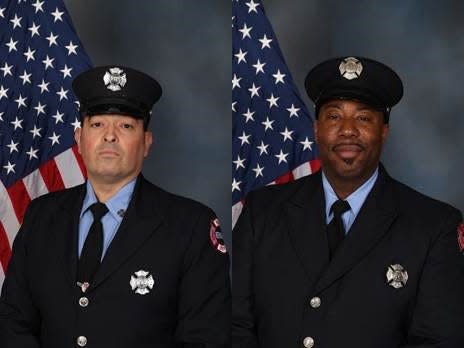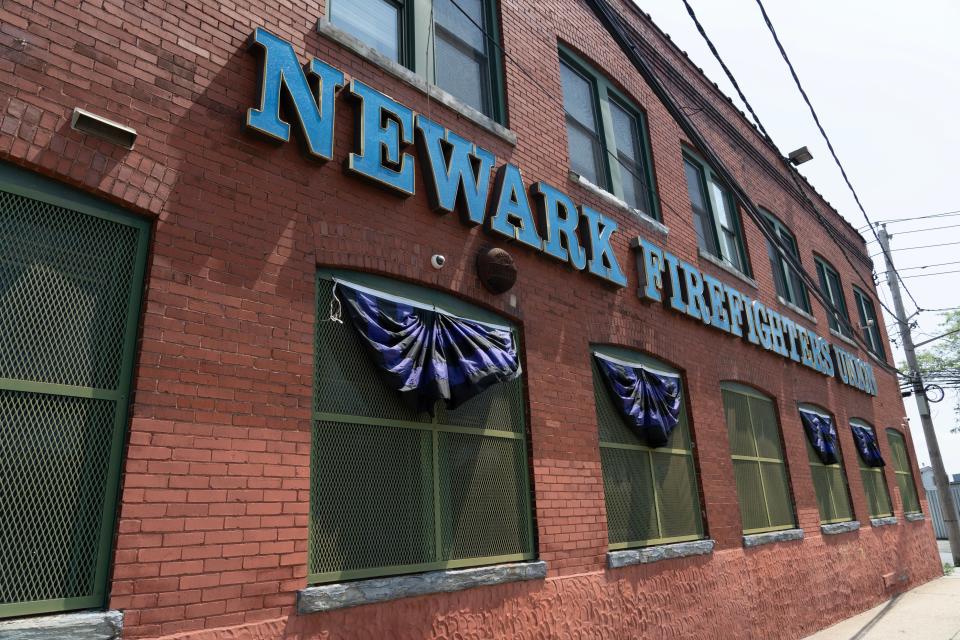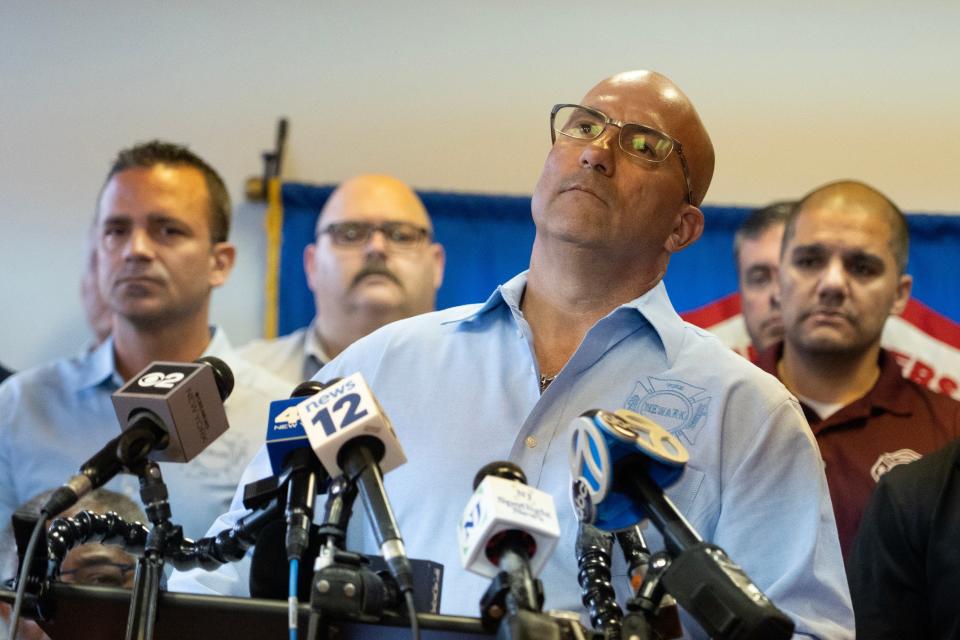As Newark firefighters are laid to rest, these are the questions we must answer | Kelly
We lost two brave firefighters last week when a massive cargo ship caught fire on the docks in Newark, New Jersey.
But why did these men die?
And could their deaths have been prevented?
Those hard questions need to be asked now as we prepare to honor Newark Firefighters Augusto Acabou and Wayne Brooks Jr. in funerals this week at the city’s majestic Roman Catholic Cathedral Basilica of the Sacred Heart.
Acabou, 45, of Newark, known to friends as “Augie,” and Brooks, 49, of Union, New Jersey, who was nicknamed “Bear” by colleagues, died when they became trapped last Wednesday night amid flames that swept through a massive Italian-owned cargo ship loaded with some 1,200 cars, most of them used and bound for resale in Africa.

A wake for Acabou is set for Wednesday afternoon at the Gothic Revival-style Cathedral Basilica, whose 232-foot granite twin towers overlook downtown Newark and the docks some 5 miles away with its damaged, smoldering cargo ship. His funeral is scheduled for Thursday morning.
Brooks will be honored with a wake at the Cathedral Basilica on Thursday afternoon — only a few hours after Acabou’s rites end. Brooks’ funeral is scheduled for Friday morning.
The multi-day ceremonies, which are expected to attract first responders from across the region as well as leading political figures, will likely become an emotional apex of a deeply unsettling week for anyone whose work requires them to run toward danger rather than from it.
Earlier: Funeral, viewing plans set for Newark firefighters killed in cargo ship blaze
Before leaving for Europe for meetings this week with NATO leaders, President Joe Biden telephoned members of the Acabou and Brooks families. New Jersey Gov. Phil Murphy ordered flags across the state lowered to half-staff.
But amid this understandable outpouring of sorrow, some disturbing facts have emerged that cry out for attention.
Why doesn't Port Newark have its own fire department?
The first involves Port Newark itself. Why doesn’t it have its own fire department?
As Newark firefighters, Acabou and Brooks were mostly trained to battle flames in homes and in office buildings. They were, after all, city firefighters. Yes, they were expected to deal with all sorts of blazes, from backyard grills that explode on a hot July Sunday to Christmas trees erupting in flames — even a grass fire along a road during a October drought.
But why are city-based firefighters also expected to battle a blaze on a ship nearly 12 stories high and 700 feet long — roughly the size of two football fields? How do you train for that? In fact, how often do you train if you’re mainly concerned with fires in homes and office buildings?
The answers to such questions have been murky — so far.
Newark officials say the city’s firefighters are expected also to respond to fires at the container port — even aboard large ships such as the Grande Costa D’Avorio. But those same officials concede that training in the specialized skills of shipboard fires is irregular — at best.
Newark Mayor Ras Baraka was even more emphatic, declaring only hours after learning of the deaths of Acabou and Brooks that the firefighters had not been properly trained for ship fires.
What has emerged is a troublesome portrait of fire protection at the port and why city firefighters with little training are called to run into danger when a blaze breaks out on a ship or amid the stacks of steel shipping containers or in a warehouse or piece of machinery at the docks.

The Port Authority of New York and New Jersey, which administers the Newark docks, brags on its elaborate website that it maintains specialized police and firefighting teams at the three major airports it oversees: John F. Kennedy International, LaGuardia and Newark Liberty International.
The authority also keeps a firefighting team at its smaller Teterboro Airport in Bergen County and has specially trained firefighting “operations personnel” at New York Stewart International Airport in New Windsor, New York.
So why not a special firefighting team at the container port?
At 272 acres, the port is three times the size of Disney World in Orlando, Florida, which, incidentally, is served by a fire department dedicated to its needs and those of other entertainment and amusement parks nearby.
In a press conference last Friday not far from the still-burning ship, Beth Rooney, the Port Authority’s director of shipping terminals, conceded that the billion-dollar bi-state agency was finally thinking about creating its own fire department to deal with emergencies on ships and nearby docks. But she offered no details, no firm promises.
Timeline: Chief breaks down department's response to fatal Newark ship fire
“As the investigations unfold, and we get lessons learned from this, everything is on the table for consideration,” Rooney said.
That’s certainly a nice thought, filled with the safe bromides of bureaucracy that typify almost any statement from the Port Authority. It would have been more comforting — and, frankly, far more responsible — if it included a few more specifics, such as a pledge to report back in two months with some preliminary findings.
In fact, why not just announce that the Port Authority plans to establish a special commission of its own to examine fire safety at the docks?
'We just lost two of our best': Newark firefighters killed in blaze on cargo ship are ID'd
Did they have the right equipment?

The next question that needs to be asked involves the kinds of firefighting equipment that Acabou and Brooks were forced to rely on when their fire engine rolled up to the dock where the Grande Costa D’Avorio was tied up.
Acabou and Brooks were both members of Engine 16, based in Newark’s Ironbound section. When they arrived on the dock where fire leaped from the deck of the Grande Costa D’Avorio, Acabou and Brooks — and all the Newark firefighters who showed up that night — were equipped with hoses that fit 2.5-inch nozzles.
When they tried to hook up their hoses to the ship’s water supply, they discovered that their hoses did not fit.
The ship’s supply would take only one-inch hoses.
In practical terms, during those crucial early minutes, Newark’s firefighters were essentially spraying water from garden hoses on fires inside the darkened decks where cars were burning.
You don’t need to be a trained fire expert to understand that Newark’s firefighters were essentially outgunned.
More: Newark firefighters killed in cargo ship fire remembered for dedication, selflessness
Officials have not conceded that yet — not specifically, anyway. But Coast Guard Captain Zeita Merchant, who oversees shipping in New York and New Jersey, said the difference in the size of firefighting nozzles is already a focus of the Coast Guard’s investigation. Several fire officials have already said such paltry hoses were a major factor in the spreading of the blaze.
Merely confirming that the nozzles were different is not enough, however. Perhaps the Port Authority, Congress and the federal government need to examine shipping standards and require any ship entering United States waters to be equipped with the kinds of fire nozzles that hook up to what American firefighting teams use. In the 21st century, how is it possible that we don’t standardize firefighting hoses — especially on ships that sail from one nation to another?
Why were they aboard at all?
A final question is this: Why were the firefighters sent onto the ship, anyway?
As the firefighters arrived, they were not greeted by sailors screaming for help from the ship’s top deck. In fact, the 28-man crew had already escaped unharmed.
The point here is that Newark’s firefighters were not sent into danger to save anyone’s life. They were essentially ordered to board a darkened ship to extinguish flames that were burning used cars.
In the coming days, as their funerals take place, we will surely hear much about the bravery of Augusto Acabou and Wayne Brooks Jr. Their lives vibrate with a basic sense of decency — that same selflessness that seems to embody so many first responders and especially firefighters. These were good men.
But we can’t just bury them and not try to answer the questions that have emerged in the wake of their deaths.
Their sacrifice calls us to answer those questions.
Mike Kelly is an award-winning columnist for NorthJersey.com, part of the USA TODAY Network, as well as the author of three critically acclaimed non-fiction books and a podcast and documentary film producer. To get unlimited access to his insightful thoughts on how we live life in the Northeast, please subscribe or activate your digital account today.
Email: kellym@northjersey.com
This article originally appeared on NorthJersey.com: Newark NJ firefighter deaths from ship fire leaves questions

